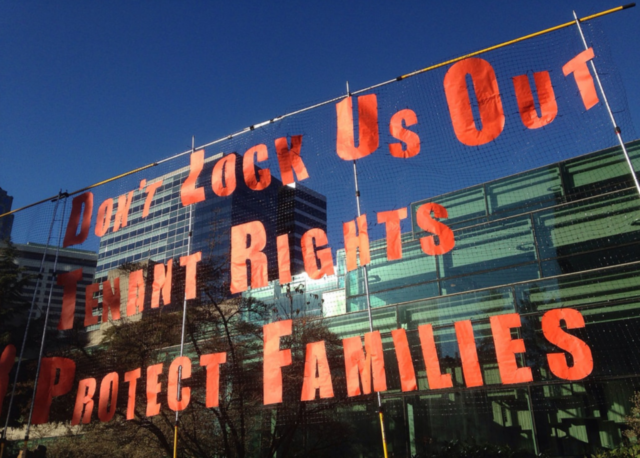Have any plans for the new year? Any goals or resolutions? Here’s an idea: join a tenants union! Don’t have a tenants union in your city? Start one!
Why a Tenants Union?
In general, I advise people to center activist movements around material conditions and to work according to principles of solidarity (i.e., side-by-side with people who share common interests). The idea is to work for things people need, in particular things capitalism denies in large part to members of marginalized groups.
It doesn’t get much more promising than housing. We all need good housing we can afford. Many of us don’t have it. Members of marginalized groups disproportionately don’t have it.
It’s getting much harder to find good housing we can afford. Homelessness in the United States has, in fact, risen in recent years. But even people who aren’t in such a dire situation have trouble. Rents have gone up more than 60% in the last several decades, a period in which median wages have gone up only 5%.
Meanwhile, developers only build high-cost luxury housing.
And that’s all before considering whether the landlords are stealing security deposits or charging illegal fees. Hint: they probably are.
A Goal: Housing as a Hub
Housing connects together a broad range of issues, both narrowly economic and also identity-based. If you can’t find a job that pays a living wage, how can you afford spiraling rent costs? When you’re an immigrant without legal status (or with precarious legal status), how can you find housing without getting ripped off by a landlord? If you’re a person of color facing discrimination from landlords, where do you turn when you can’t prove it in court?
As such, housing provides a way to practice the best kind of identity politics. We can work on the specific needs of certain groups, as represented in individual cases of, e.g., bias. Say, for example, the fact that the Latinx population in Iowa City faces devastating home loan bias. Across groups, these needs have natural common features that get at deeper, systemic issues.
A tenants union is uniquely positioned to do this work. If there’s a major structural problem with trade unionism, it’s the tendency to advance the short-term interests of specific workers without regard for impact on the broader working-class community. A union, for example, might lobby a city council to build an unwanted high-rise. Perhaps that’s good for some workers for the next 2 years. But it might be bad for the public for the next 50 years.
Trade unions are already thinking about these issues, in part in the context of how to stay vibrant and sustainable. The Teamsters, for example, run a community action network that partners with local groups.
A tenants union fits naturally into this picture. It’s a working-class community group by its very nature.
A Goal: Public Housing
Public housing makes sense on both policy and philosophical grounds.
On policy grounds, we know the market can’t deliver. It can’t do it without taxpayer support. It can’t do it with taxpayer support. The incentive is for developers to continue demanding taxpayer welfare, lobbying against regulation, and building luxury housing.
The best policy solution is good public housing. For homelessness, the Housing First model, which sometimes involves public-private partnerships (e.g., in Utah), works best. But for the much larger number of people with wider-ranging housing needs, only public housing works.
In Iowa City, where I live, rents have increased in double digits in the last 3 years, including 30% for single-occupant, efficiency units. Median household income, adjusted for inflation, steadily declined from 2000 to 2014.
The city has a public housing program. But it’s woefully inadequate.
The program operates only 81 units. The city’s own internal data show more than 5,000 households that can’t afford where they live. 500 public housing units wouldn’t be enough, but it would be a start. 81 is a travesty. The city will never solve this problem via development, because it’ll never be in the economic interest of developers to solve it.
On philosophical grounds, housing should be a right and a basic public service. Housing, health care, food security, and education are basic, central services that should be part of any society. And they form a firmer ground for activism than alternatives like UBI, which doesn’t work. Removing these services from the market and putting them under public, democratic ownership is the underlying basis of a free society, and a first step toward a socialist one.
A Theme: Collective Action
Tenants unions, as with any good union, are focused on democratic, collective action. What the union does is up to its members. And the union is only as good as the work its members put into it.
What should a tenants union do?
Again, it depends on what its members want to do. But my advice is to focus on what we can do by building popular power outside of government or other formal institutions. Those institutions are designed to slow down our work and force us to operate outside of popular power and through arcane rules and procedures.
Tenants unions can do things like: protest landlord offices, organize boycotts or strikes, help tenants form demand letters, put tenants in contact with one another, etc.
Public housing is more a longer term goal, and a demand we can make of governments. But ultimately it’s their job to do the work on public housing.
Tenants Unions in Iowa
The local Democratic Socialists of America chapter in Iowa City is working on putting together a tenants union. If you’re in or near Iowa City, sign up here!
Statewide, there are other tenants unions formed or in progress:
Ames Tenants Union
Dubuque Renters Union
If you’re not in Iowa, or if you’re in a different part of the state, get some people together and start one!
